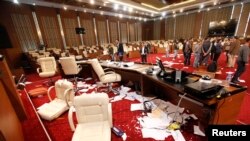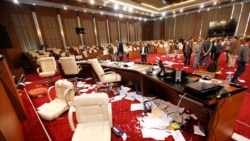It’s been nearly two years since Libyans went to the polls to elect a new General National Congress. It was Libya's first free national election in six decades, and it did not come easy.
In early February 2011, and simultaneously with other regional protests today known as the Arab Spring, Libyans staged a peaceful demonstration against then-Libyan dictator Moammar Gadhafi. The Gadhafi regime’s violent reaction to the protests sparked a full-blown civil war.
Soon after, in late February 2011, a collection of former politicians, former military officers, tribal leaders, intellectuals and businessmen from all over Libya, met to form an opposition government that united all factions. On February 27th, they announced that the National Transitional Council would act as "the political face of the revolution.”
The National Transitional Council ruled Libya through 10 months of fighting, until, helped by a NATO-enforced no-fly zone, opposition forces finally overcame the last pockets of loyalist resistance, and captured or killed the leaders of the Gadhafi government, including Moammar Gadhafi himself.
On October 23, 2011, the National Transitional Council officially declared Libya to be liberated. But none of this could have been done had the Libyan people not worked together. Disregarding regional, tribal, and political differences, they united to bring their common enemy to his knees, and to open the door to a bright new future for Libya.
But unfortunately for Libya and its people, this spirit of cooperation did not last long. The formerly united opposition forces splintered into armed interest groups that demanded greater political power to further narrow agendas. Kidnapping, looting, robbery, revenge killings, intimidation and extortion have become common place in many communities in Libya. Within the General National Congress, tensions between Libyans of different backgrounds and political philosophies have weakened the government and left it unable to provide the Libyan people security or basic services.
This is the time when Libya most needs political consensus to move forward its democratic transition, a process that can only advance through peaceful dialogue.
The United States urges all Libyans to work together to find common ground to ensure security and good governance for their country so that they can move, together, toward a bright future.
















